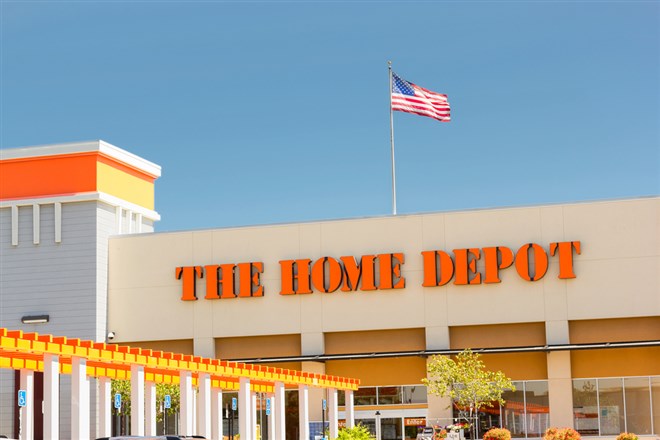
It’s setting up to be another strong quarter for The Home Depot (NYSE:HD). The home improvement retailer is expecting to report earnings per share of $2.61 on revenue of $30.45 billion. And the whisper number suggests that the company’s EPS may be even higher ($2.74).
Sequentially, the quarter ending on January 31 is one of the company’s weaker quarters. And this year will be no different. Those numbers would mark a 13% EPS decline from the prior quarter and a drop of nearly 10% in revenue. However, on year-over-year (YOY) basis, the numbers would reflect continued strength. A $2.74 EPS would be a 20% year-over-year (YOY) beat, and a similar YOY beat (18%) in terms of revenue.
With limited forms of entertainment, many homeowners turned their attention to improving their homes. And with many contractors being unavailable in the early days of the pandemic, there was growth in the do-it-yourself sector.
And what growth it was. Home Depot has posted a 23% compound annual growth rate (CAGR) in the last two quarters. That’s far above the company’s average CAGR of 5.2% over the last decade. Analysts are expecting Home Depot’s CAGR to potentially remain in double digits in 2021. But even at 10% the company’s CAGR will be down over 50%.
However after the stock returned to pre-pandemic levels, HD stock is down approximately 25% in the last six months. Some of that is due to the company’s exposure to increasing material costs for items such as lumber.
Since HD stock was not getting traction with exceptional growth, it’s logical for investors to expect the stock to go down. Still, analysts remain largely bullish on the stock. In this article, we’ll take a look at why Home Depot should is still worth the attention of investors.
How long can the pandemic tailwinds last?
It’s not clear that Americans spent their initial stimulus checks on home improvement. Economists are reporting that for Americans who are still working, the stimulus checks were used to shore up their personal balance sheets. The savings rate is up and credit card debt is down.
And, according to Bloomberg, a Morning Consult survey says that approximately one-third of Americans said they were likely to save a “significant amount” of any stimulus check they receive. However in the same survey 11% said they would be using the stimulus on home improvement.
Some analysts are suggesting that as the economy reopens, homeowners will feel more comfortable with allowing workers in their homes. The implication would be that it would take some of the steam out of the DIY market. That may be true, but contractors still do business with Home Depot so it’s too early to suggest that would be a negative.
Is All the Growth in HD Stock Fully Priced In?
It’s unlikely that Home Depot will sport growth that is anywhere close to the 23% growth in the last two quarters. But if you were counting on that, then there are several plots of land you may be interested in. No, most investors understand, and profited from, the unique circumstances created by the pandemic.
However, while the outsized growth from the pandemic should abate in the second half of this year, the company will have a tailwind from what will likely be a strong housing market. According to the Commerce Department, housing starts and building permits rose in December.
And the company is ready for that growth. Home Depot has made a successful pivot to e-commerce. The home improvement sector remains an area that has been largely immune to the Amazon (NASDAQ:AMZN) threat. As evidence of that the company reported 80% growth in digital sales in the third quarter with 60% of those order being picked up in-store. If the company can continue that trend of lowering its shipping costs, that will be a further boost to the bottom line.
But let’s say that the company’s growth doesn’t play out as hoped? In that case, investors can still benefit from Home Depot’s status as a premier dividend stock. The company has issued $59 billion to shareholders by way of share repurchases and dividends in the last five years and has a $2.18% dividend yield. Home Depot last raised its dividend in February 2020 so investors will want to pay attention to see if the company raises its dividend when it reports.
Before you consider Home Depot, you'll want to hear this.
MarketBeat keeps track of Wall Street's top-rated and best performing research analysts and the stocks they recommend to their clients on a daily basis. MarketBeat has identified the five stocks that top analysts are quietly whispering to their clients to buy now before the broader market catches on... and Home Depot wasn't on the list.
While Home Depot currently has a "Moderate Buy" rating among analysts, top-rated analysts believe these five stocks are better buys.
View The Five Stocks Here
Click the link below and we'll send you MarketBeat's list of seven best retirement stocks and why they should be in your portfolio.
Get This Free Report